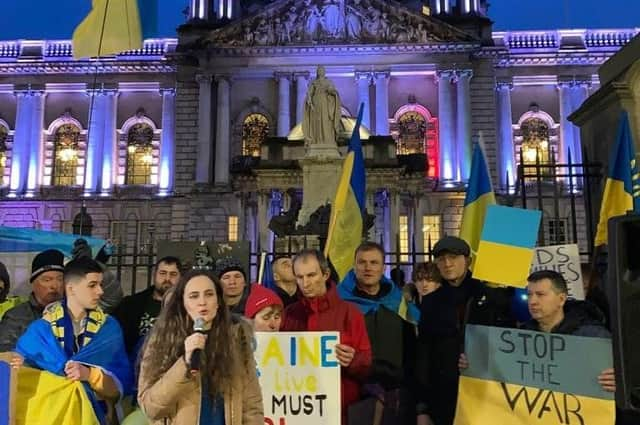Ben Lowry: My memories of visiting a Ukraine that seemed part West, part Soviet


I visited the nuclear plant in February 2007, which I had wanted to do for several years after reading that it had become an unexpected wildlife centre after the area was largely abandoned in the aftermath of the 1986 reactor disaster there. A wide zone around the contaminated reactors had become an exclusion area.
It was a peculiar place, with flashes of the best and worst of the old Soviet system.
Advertisement
Hide AdAdvertisement
Hide AdThe sloppiness that led to the accident was an example of the worst. But before the radiocative disaster, there had been an attempt to make Chernobyl a modern, happy community in which workers at the nuclear plant could raise families. A town called Pripyat had been built near to the processor, with modern apartments and a ferris wheel.
But those apartments, which would have been good places to live in the wealthy UK, let alone in a struggling communist society, were abandoned overnight.
In 2007 they were empty and covered in debris and broken glass. There were newspapers still lying on floors, dated from 1986.
Away from this new town, detached houses had been so reclaimed by the nearby forests in a mere 21 years that you could barely see some of them, with plants and weeds entagling them so that sometimes only a chimney was visible.
Advertisement
Hide AdAdvertisement
Hide AdThe other reason I had wanted to go to Ukraine was the Orange Revolution of 2005, when the public rose up against what was believed to have been a rigged presidential victory for Viktor Yanukovych, the pro Russian candidate (he was ousted, but later re-elected to the post).
A journalistic regret of mine was not to have got to the Balkans in the 1990s, one of the most important and troubling periods in modern European history, and I did not want to make that mistake with Ukraine, hence the 2007 trip. A former news editor of mine had talked to me about how it was one of the most fascinating countries in Europe that might end in civil war.
In 2007 I was struck by a society that at times seemed affluent and western and full of youth and promise and enterprise, with bustling internet cafes and modern bars, and in places seemed to be impoverished and stuck in the old, inefficient, hidebound USSR.
The trip was memorable also because my companion — a journalistic colleague and friend — and I were arrested in the Moscow-controlled breakaway region of Transnistria, which is one of Ukraine’s pro Russian regions.
Advertisement
Hide AdAdvertisement
Hide AdWe were lulled into the area by a false sense of normality when we visited the attractive Black Sea city of Odessa and came across a simple bus journey that went across Transnistria to Moldova, a short distance away. We were detained by police in a saga that became comical when my colleague lost his passport and we were almost taken away for further questioning by the pro Russian authorities. I think the situation might have been resolved by a payment. We got out but had to enter Moldova without documentation, which led to a court appearance in Chisinau.
It was a dramatic glimpse of a split part of Europe in which some people look West and others look East — a space that has now been plunged into war.
A chilling aspect of the current crisis is the way in which President Vladimir Putin has taken a number of breathtaking but carefully calculated military moves because he now thinks that we (western Europe and America) are no longer strong enough to retaliate in ways that can thwart his seizures.
And this ties in with a wider malaise in the western democracies that is, I believe, linked to our immense wealth. We have become spoilt, indulgent and soft.
Advertisement
Hide AdAdvertisement
Hide AdIt was good to see support for Ukraine in Belfast last night. It reflects the spirit of Northern Ireland I love, a place with great potential and future. But I also think at times we are a microcosm of wider western problems. We are not only unrealistic in our use of public funds, but furiously demand for more.
Like elsewhere, much of our discourse is driven by sentimentality and we are increasingly indulgent of new ‘woke’ theories, such as dismissing as prejudice the desire of many elderly women to be treated only in single sex hospital wards.
The Ukraine crisis has complex origins but one alarming factor is that west’s rivals, such as China, Russian and Iran, see us as weak.